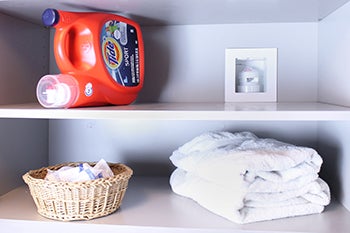Sewer gas smell can make your home feel unpleasant and uninviting. These sulfur-like smells can make living in your home almost unbearable, disrupting your peace of mind and making it difficult to relax.
But such odors can be more than simply unpleasant: They can also be a health hazard —indicating that a more serious problem is lurking in the plumbing system.
What Causes a Sewer Smell in Your Home?
Several factors can contribute to an unpleasant sewer odor.
-
A blocked or damaged sewer line: As wastewater and sewage flow through sewer pipes, any blockage or damage can lead to leaks or backups, resulting in a distinct sewage smell permeating the house. These odors can also be caused by improperly installed drainage, which can be as simple as stuffing a rag into an open drain pipe and trying to cover it up with a wall instead of using a cap that would securely seal the pipe opening.
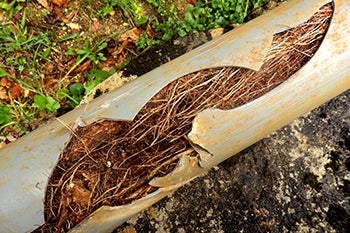

-
A dry P-trap: Typically, any fixture you use regularly will not trigger this issue. However, floor drains in laundry rooms or basements that seldom see drainage often have a dry P-trap. If a washing machine, laundry tub, sink, or tub/shower in a basement has gone unused for an extended period, the water inside the P-trap can evaporate. This will then allow a foul odor to escape into the air.
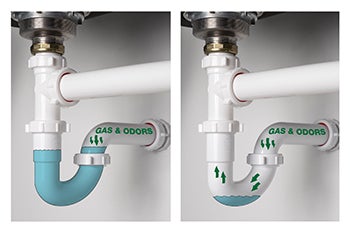
-
Improperly installed toilets: A toilet flange installed too low (below the finished floor, instead of above) will render the wax ring ineffective because it cannot create compression between the toilet and the flange. In addition, the installer may have compressed the wax too much on one side, allowing just enough room for sewer gas to escape.

Other possibilities:
If you have a vacation home, chances are high that a sewer smell might occur. After months of inactivity, the P-trap can dry out just enough to allow air to push out a sewer smell into the home.
Older homes often have old and corroded galvanized steel or cast iron piping that will develop cracks through which sewer gas can escape. In such instances, a plumber would likely find it difficult to diagnose the problem and find a leak: It could be any pipe behind any wall in any room.
Even so, addressing any sewer smell promptly is essential because of the health hazards mentioned above. If you experience a persistent sewer smell, contact a professional plumber to identify and resolve the underlying issue.
Eight Ways to Prevent a Sewage Smell in Your Home
Here are some tips to help you avoid the unpleasant odor of sewage in your home:
-
Keep P-traps filled with water so they don’t dry out
Ensure the P-traps under your sinks, showers, and toilets always have water. If needed, dump a bucket of water down the drain to reprime the trap. Eventually, as you put more water in the drain, you will ensure smooth wastewater flow to prevent buildup and clogs and reduce the chances of a sewage smell.
-
Use a drain seal to block odors
Oatey® Drain Seal uses a one-way valve to block odors, insects, and rodents from entering your home. Specifically designed for infrequently used drains, where problems often develop, the product is compatible with drains or pipes with a two-inch or three-inch outlet. That makes it suitable for basements, laundry rooms, or shower drains.
The installation process is tool-free and easy, but it is crucial to select the correct size for your pipe; i.e., if you have a two-inch line, be sure to use a two-inch drain seal to ensure a proper fit and effective sealing.

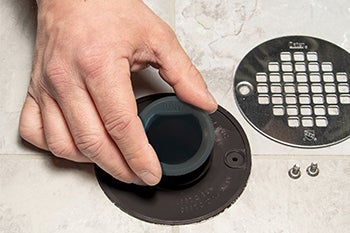
-
Use drain strainers to catch debris
Install drain strainers in sinks, showers, and floor drains to catch debris and prevent it from entering the pipes. This helps to prevent clogs and keeps sewer odors from escaping into your home.
-
Use pipe plugs to identify leaks
Cherne® Gripper® Plugs can be a valuable tool in combating sewer smells. These plugs are specifically designed for DWV (Drain, Waste, and Vent) testing and stack testing. Their end-of-pipe design provides a secure fit that won’t fall into the pipe during the testing process.
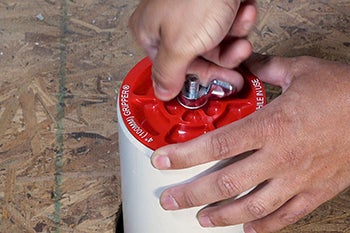
Additionally, the inside-of-pipe design of the Gripper Plugs allows you to position the plug as far into the pipe as necessary. This feature is handy when trying to pinpoint the source of sewer smells.
By inserting the gripper plug into the pipe and filling it with smoke, you can easily detect where the smoke exits, helping you identify any potential leaks or points of odor escape. Plumbers will find this product especially beneficial, as it helps them conduct efficient and accurate testing on pipes and drains, contributing to a healthier and odor-free home environment.

-
Maintain your plumbing system
Regularly inspect and maintain your plumbing system to identify leaks, damaged pipes, or blockages early on. Promptly repair any issues to prevent sewage leaks and unpleasant odors.
-
Properly vent your plumbing system
Ensure that your plumbing system has appropriately installed vents to allow for the release of sewer gases. Regularly check these vents to verify they are not blocked by debris or obstructed.
Oatey Tip: If you can’t connect to an existing venting system due to complex pipe routing issues or obstructions, Air Admittance Valves are a great alternative for remote bathroom groups, home remodels and additions.
-
Dispose of waste properly
Avoid flushing items that cause blockages — wipes, feminine hygiene products, or excessive toilet paper. Dispose of these items in the trash to prevent clogs and potential sewage backups.
-
Schedule regular sewer-line inspections
Have a professional plumber periodically check your sewer lines for damage or blockages. Catching and resolving issues early can prevent sewer smells from entering your home.
Following these preventive measures can significantly reduce the chances of experiencing a sewage smell in your home. Remember, if you do encounter persistent odors, it is always best to contact a professional plumber to identify and remedy the underlying cause.

